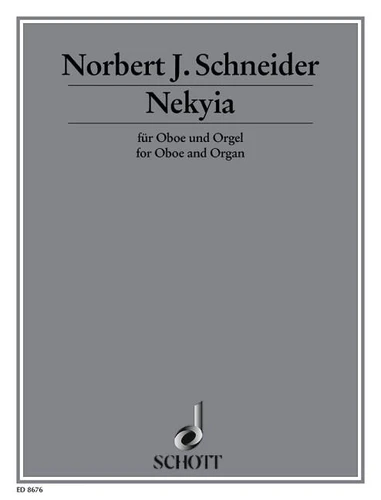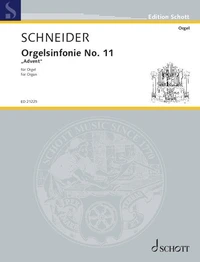Nekyia. oboe (cor anglais ad libitum) and organ.
Par :Formats :
- Paiement en ligne :
- Livraison à domicile ou en point Mondial Relay estimée à partir du 9 décembreCet article sera commandé chez un fournisseur et vous sera envoyé 10 jours après la date de votre commande.
- Retrait Click and Collect en magasin gratuit
- Livraison à domicile ou en point Mondial Relay estimée à partir du 9 décembre
- Réservation en ligne avec paiement en magasin :
- Indisponible pour réserver et payer en magasin
- Nombre de pages30
- Poids0.135 kg
- ISBNM-001-12082-4
- EAN9790001120821
- Date de parution01/01/2000
- ÉditeurSchott
Résumé
'Nekyia' is one of the world's basic principles in the mythology of antiquity : each striving after higher values, each spiritualization and each attempt at perfection presupposes the passage through Hades. Each mountain is juxtaposed by the bottom of a valley. Light for its existence also needs darkness, as heaven needs hell. 'Nekyia' is the archetype of all religions. Orpheaus had to descend into Hades in order to gain life for Euridice.
Christ had to die to bear witness of life eternal. Hence the composition 'Nekyia' consists of three parts which should be distinguished in shape and expression : part 1 with its lively rhythms stands for the physical, the material and secular, part 2 (bb 71-154) symbolises the encounter with death, part 3 ('Lux Perpetua') refers to a state of mellowness in which life and death are balanced and integrated.
Instrumentation : oboe (cor anglais ad libitum) and organ
Christ had to die to bear witness of life eternal. Hence the composition 'Nekyia' consists of three parts which should be distinguished in shape and expression : part 1 with its lively rhythms stands for the physical, the material and secular, part 2 (bb 71-154) symbolises the encounter with death, part 3 ('Lux Perpetua') refers to a state of mellowness in which life and death are balanced and integrated.
Instrumentation : oboe (cor anglais ad libitum) and organ
'Nekyia' is one of the world's basic principles in the mythology of antiquity : each striving after higher values, each spiritualization and each attempt at perfection presupposes the passage through Hades. Each mountain is juxtaposed by the bottom of a valley. Light for its existence also needs darkness, as heaven needs hell. 'Nekyia' is the archetype of all religions. Orpheaus had to descend into Hades in order to gain life for Euridice.
Christ had to die to bear witness of life eternal. Hence the composition 'Nekyia' consists of three parts which should be distinguished in shape and expression : part 1 with its lively rhythms stands for the physical, the material and secular, part 2 (bb 71-154) symbolises the encounter with death, part 3 ('Lux Perpetua') refers to a state of mellowness in which life and death are balanced and integrated.
Instrumentation : oboe (cor anglais ad libitum) and organ
Christ had to die to bear witness of life eternal. Hence the composition 'Nekyia' consists of three parts which should be distinguished in shape and expression : part 1 with its lively rhythms stands for the physical, the material and secular, part 2 (bb 71-154) symbolises the encounter with death, part 3 ('Lux Perpetua') refers to a state of mellowness in which life and death are balanced and integrated.
Instrumentation : oboe (cor anglais ad libitum) and organ





















